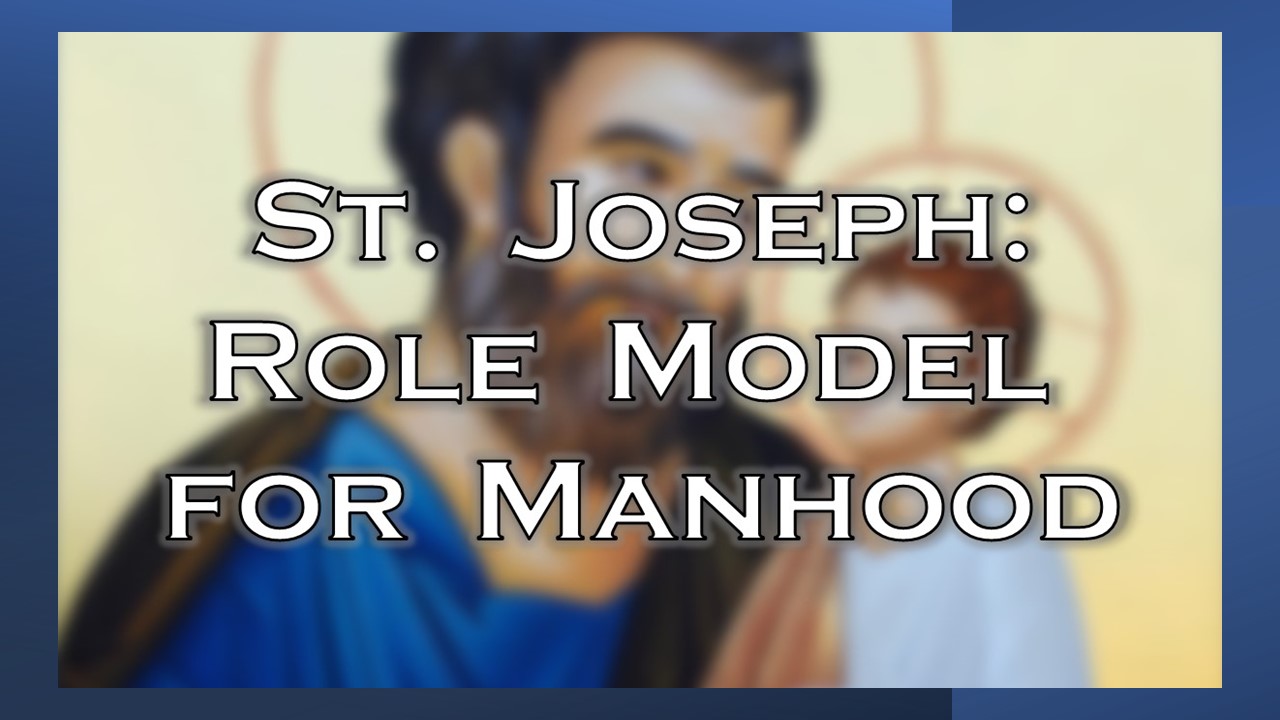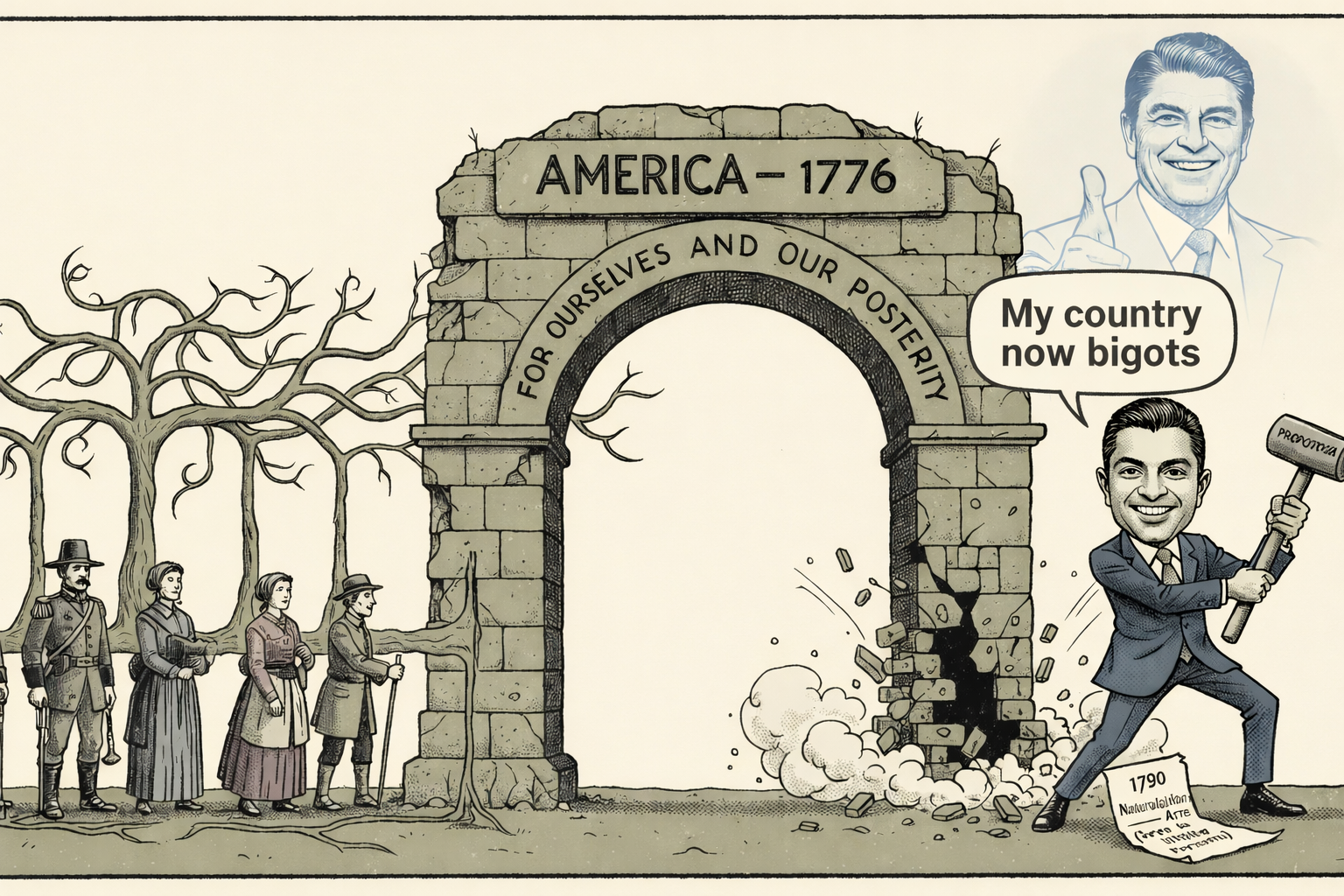Quality masculine role models are rare today. We certainly won’t find one in the current leader of the free world or his family. Corrupt, effeminate, imbecilic, perverse, drug use, etc. Sadly, this is the same image of the modern man propagated by western popular culture and institutions. We face a crisis of the emasculated western man. While the antithesis of Biblical masculinity is useful for what NOT to be, I believe a positive role model is much more valuable and powerful towards restoring western manhood.
The institution of the Catholic Church has its flaws. However, one recent commendable directive decreed a Year of St. Joseph from December 8, 2020 to December 8, 2021. I recently completed a 33-day Consecration to St. Joseph from Fr. Donald Calloway, MIC, where I came to know St. Joseph more intimately. He provides an outstanding role model and a potent antidote to the poisoning of the modern, western man.
This article applies St. Joseph’s lessons to address problems of contemporary manhood. I borrow and synthesize many of the concepts explored more deeply in Fr. Calloway’s book. Through his example, we can each become the St. Joseph-like role model of masculinity to guide our family, friends, and communities.
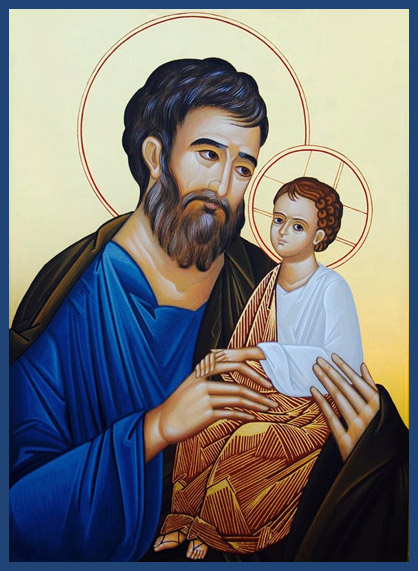
Problem #1: Men have abdicated their leadership of the family and household
Solution #1: St. Joseph exemplifies leading the Holy Family as courageous, faithful, and steadfast
Pope John Paul II said, “As the family goes, so goes the nation and so goes the whole world in which we live.” Judging by the state of our world, it is no surprise that the nuclear family is also in turmoil. Broken families seem like the norm. Men have abdicated their role as the head of the family and household. St. Joseph shows us a better way through a concrete example of God’s natural order.
Courageous Leader: Early in the New Testament we experience St. Joseph’s take-charge attitude towards caring for and protecting his family:
And after they were departed, behold an angel of the Lord appeared in sleep to Joseph, saying: Arise, and take the child and his mother, and fly into Egypt: and be there until I shall tell thee. For it will come to pass that Herod will seek the child to destroy him. Who arose, and took the child and his mother by night, and retired into Egypt: and he was there until the death of Herod
Matthew 2:13 – 14
St. Joseph’s courage and willingness to trust in God is noteworthy. At the prompting of an angel, St. Joseph led the Holy Family on a long and dangerous journey to Egypt. Egypt was a land notorious for thieves, pagan rituals, idols, and sorcerers, and presented a legitimate risk of being attacked. I can just imagine contemporary critics labeling St. Joseph’s actions as “toxic masculinity”. After all, he did not consult Mary or check his privilege. He simply heard God’s call and acted in his capacity as leader of the household.
Faithful: Upon learning of Mary’s Immaculate Conception, St. Joseph faced a challenging decision and even contemplated leaving the family.
While Mary was espoused to Joseph, before they came together, she was found with child, of the Holy Ghost. Whereupon Joseph her husband, being a just man, and not willing publicly to expose her, was minded to put her away privately. But while he thought on these things, behold the angel of the Lord appeared to him in his sleep, saying: Joseph, son of David, fear not to take unto thee Mary thy wife, for that which is conceived in her, is of the Holy Ghost. And she shall bring forth a son: and thou shalt call his name Jesus. For he shall save his people from their sins. Now all this was done that it might be fulfilled which the Lord spoke by the prophet, saying:
Behold a virgin shall be with child, and bring forth a son, and they shall call his name Emmanuel, which being interpreted is, God with us. And Joseph rising from sleep, did as the angel of the Lord had commanded him, and took unto him his wife. And he knew her not till she brought forth her firstborn son: and he called his name Jesus
Matthew 1:18 – 25
The specific wording here varies by translation. You may see “put her away privately”, “put her away privily”, “divorce her quietly”, “send her away quietly”, etc. The Catholic Church posits three theories about St. Joseph’s action plan: The Suspicion Theory; The Stupefaction Theory; and The Reverence Theory. For brevity, these theories will not be explored. However, all three indicate St. Joseph’s faith needed testing, just like Abraham’s (Genesis 22). Fortunately, St. Joseph passed the test! This sequence illustrates that even the best among us face trying circumstances in family life. As St. Joseph did, turning to God gives us the fortitude to remain faithful.
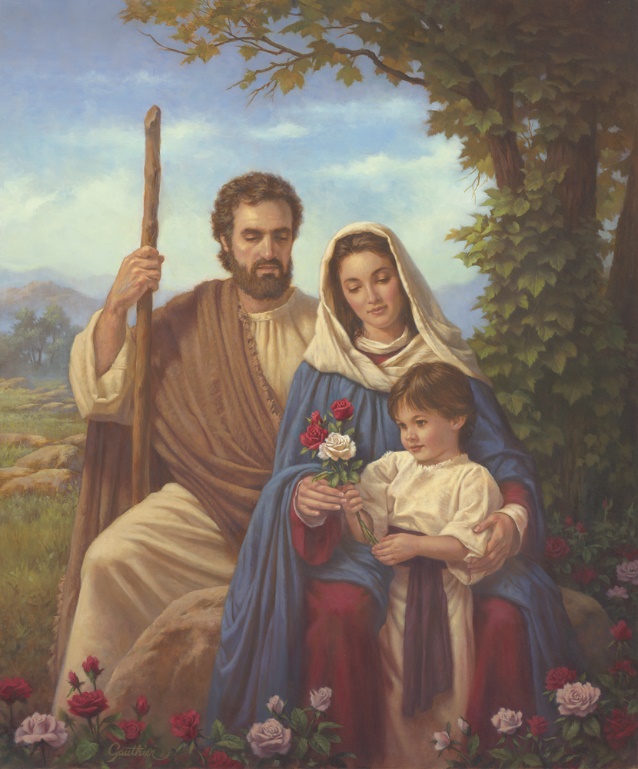
Problem #2: Roughly a quarter of American children live without a biological, step, or adoptive father
Solution #2: St. Joseph was a present father figure who raised Jesus well
A quick internet search illustrates a laundry list of problems in fatherless households. Increased rates of poverty, incarceration, crime, substance abuse, and obesity, to name a few. St. Joseph not only remained present in Jesus’ life, but he was also his provider, educator, and protector.
The verses presented above from Matthew’s Gospel demonstrate that God gave St. Joseph the legal responsibility to name Jesus. However, his fatherly relationship is much deeper than merely legal. In Latin, the title given to St. Joseph to signify his role as foster father is Filii Dei Nutricie, which literally means “Nurturer of the Son of God.” Although St. Joseph’s explicitly recorded appearances are sparse in the Bible, we know that Jesus spent the first 30 years of his life under his loving protection and guidance.
It was under the loving fatherhood of St. Joseph that Jesus fully realized his humanity. He learned and grew in virtue to successfully complete his public ministry and establish his earthly kingdom. Undoubtedly St. Joseph imparted his virtues to Jesus. Jesus learned the value of hard work and manual labor in Joseph’s workshop. A pious man, Joseph shared his devotion to God. Jesus learned scripture and gained such wisdom that he even astonished the teachers in the temple when only 12 years old! Surely Joseph’s influence informed some of the wonderful parables Jesus taught. St. Joseph was a model father.
Problem #3: The modern American man is lazy, unskilled, and destroys value
Solution #3: St. Joseph is the “Model of Workmen” and demonstrates the values of hard work
I am blessed that my dad taught me how to fix things, build things, and just generally work hard. This experience differs from that of many American males today. I recall the shock from the family of a former girlfriend when I described spending hours on the garage floor replacing the clutch and exhaust on my car. Or weeding and tilling my yard with only hand tools. They simply could not recognize the value or merit in doing such manual labor. Sadly, I don’t think her family is unique today. Looking back on high school, students with blue-collar career interests were treated as second-class citizens compared to their college-bound classmates.
As shown in “The Rejection at Nazareth”, St. Joseph was a carpenter and Jesus followed in his footsteps:
And coming into his own country, he taught them in their synagogues, so that they wondered and said: How came this man by this wisdom and miracles? Is not this the carpenter’s son? Is not his mother called Mary, and his brethren James, and Joseph, and Simon, and Jude: And his sisters, are they not all with us? Whence therefore hath he all these things? And they were scandalized in his regard.
Matthew 13:54 – 57
Jesus spent the years before his public ministry performing the humble work of a carpenter. If Jesus emulated his hard-working, blue-collar, foster father, and we want to emulate Jesus in all that we do, then we too should emulate St. Joseph’s blue-collar work ethic and skill set.
Furthermore, we see how the people in “The Rejection at Nazareth” scoffed at the possibility that a humble carpenter could possess such wisdom. We too should be prepared to face ridicule from the societal elites who might be afraid to get some grease under their nails or develop a callus. I am proud to endure all ridicule in the imitation of Christ and St. Joseph.
Problem #4: Masculine character has eroded
Solution #4: St. Joseph exemplifies traits of chastity, justice, and prudence
The weakness of modern man’s character is no secret. Turn on any television. Whether the programming or commercials, we see the normalization of lust, promiscuity, profanity, deceit, temptation, etc. This degeneracy flows into the psyche of the populace, clearly by design, with profound effect.
The Litany of St. Joseph confers the titles “Most Just”, “Most Chaste”, and “Most Prudent”. Besides Mother Mary, no other saints can be invoked as the superlative of these virtues.
Justice: The contemporary phrase “social justice” has perverted the Biblical concept of “justice”. Ask a random American to define “justice”. They might respond with something like “companies must have a person of color on their board.” Or “ban white babies.” These distorted interpretations are systematically injected into the national conversation. When I hear justice in the secular context today, I want to tune it out. However, justice is a fundamental concept in the Bible, second perhaps only to mercy.
In the first chapter of his Gospel, St. Matthew refers to Joseph as “a just man” (Matthew 1:19). What does this mean? According to St. Josemaría Escrivá:
Saint Joseph was an ordinary sort of man on whom God relied to do great things. He did exactly what the Lord wanted him to do, in each and every event that went to make up his life. That is why Scripture praises Joseph as “a just man.” In Hebrew a just man means a good and faithful servant of God, someone who fulfills the divine will (cf. Gen 7:1; 18:23-32; Ezek 18:5ff; Prov 12:10), or who is honorable and charitable toward his neighbor (cf. Tob 7:6; 9:6). So a just man is someone who loves God and proves his love by keeping God’s commandments and directing his whole life towards the service of his brothers, his fellow men.
This definition provides an excellent litmus test for our lives. How do we love God and prove this love? Do our lives conform with the Ten Commandments (Exodus 20:1-17)? How about the two greatest commandments Jesus specified (Matthew 22: 34-40)? Do we love and praise God through our religious obligations for Mass attendance and Confession?
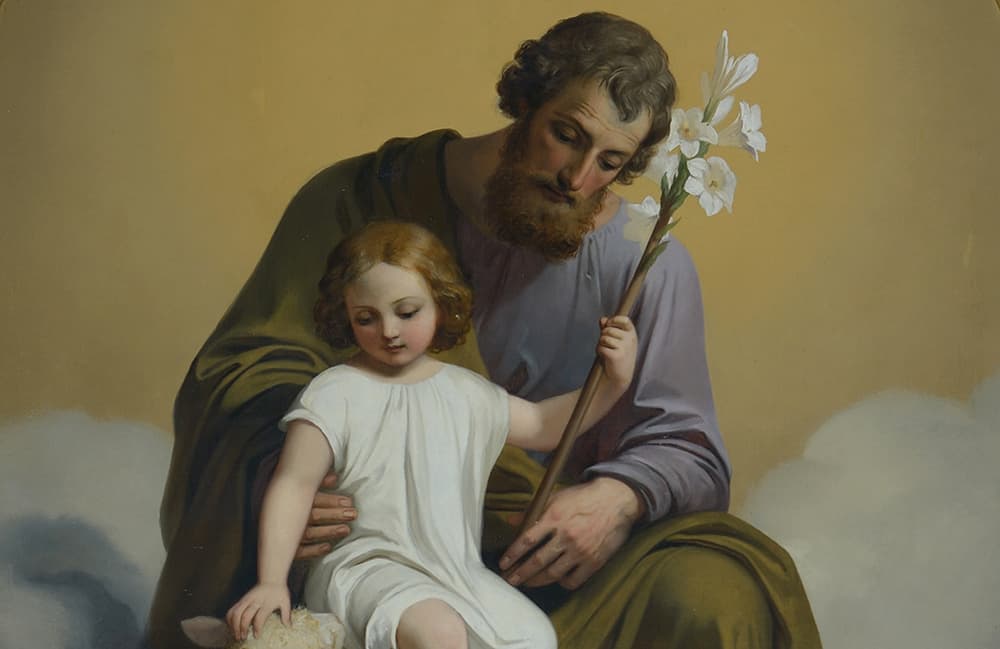
Chastity: Chastity is the virtue that prevents us from being slaves to our passions. Consider the irony of the various so-called “freedom” movements of the last century, such as the “Sexual Revolution”. People erroneously believe they achieved the freedom to do whatever they want, whenever they want, with whomever they want. Ironically, this is not freedom, but rather slavery to carnal pleasures and passions. These feelings become the slave driver that directs every thought, feeling, and action. Such lust-driven actions offend God, ruin families, and wreck societies.
St. Joseph perfectly models chastity, even to the point of celibacy because of his duty to serve as “the Chaste Guardian of the Virgin.” Fr. Calloway’s description follows:
Saint Joseph and Mary lived in what is often called a “Josephite marriage.” They were truly husband and wife, but they never engaged in sexual relations. Their vocation was to be united in heart, mind, and soul, but never in body. They were both consecrated to God and sacrificed a natural good for a greater good: the salvation of souls.
To be clear, I am not advocating “Josephite marriages”! On the contrary, creating and nurturing big Christian families is one of the best things we can do to glorify God and make disciples of all nations. However, St. Joseph provides a pure and perfect model of chastity. He expunged the pleasure-seeking, self-serving motivators which define contemporary sexuality. Popular culture mocks chastity. People who refrain from such immorality are regularly ostracized. Correcting this sinful culture requires us men to step-up as leaders and model chastity. Fr. Calloway summarizes, “If men today were more like St. Joseph – protectors and defenders of beauty, instead of users and abusers of the feminine mystery – what a different world this would be.”
Prudence: Prudence is another virtue that has been misconstrued in the modern lexicon. It is often heard as tentative, timid, or wishy-washy. According to The Catechism of the Catholic Church:
Prudence is the virtue that disposes practical reason to discern our true good in every circumstance and to choose the right means of achieving it… It is not to be confused with timidity or fear, nor with duplicity or dissimulation. It is called Auriga virtutum (the charioteer of the virtues); it guides the other virtues by setting rule and measure.
The end of this definition merits emphasis. Prudence governs all other virtues through managing the extremes. Fr. Calloway summarizes the tangible occasions where we observe St. Joseph’s prudence:
Without prudence, no leader can exercise temperance, justice, and fortitude. Saint Joseph, king of the Holy Family and your spiritual father, is (after Jesus) the most prudent of all men. In every situation in life, he is a model of prudence. He prayed and waited on the Lord to reveal the mysteries of his wife’s pregnancy to him. He educated the God-Man and, in every situation, allowed prudence to govern his actions.
We should all strive for such prudence. When faced with a difficult decision or circumstance, do we turn to God in prayer to ask for guidance? St. Joseph perfectly models this method of pondering, prayer, discernment, and action.
Problem #5: Men of this materialistic society are only concerned with earthly things
Solution #5: St. Joseph completely trusted in God’s divine providence to sustain him
Wealth and possessions are arguably the leading measures of so-called success today. This mentality creates incentive structures to lie, cheat, and steal. This measuring stick of success is laughable. Its application to the Holy Family indicates failure, which is false given Christ’s empire on earth has faced relentless persecution from the beginning and yet persisted for 2,000 years.
The Litany of St. Joseph confers the title “Lover of Poverty”. Did he love being poor? Probably not. But he perfectly modeled material detachment, a virtue we should all pursue to prevent us from becoming content with this world rather than hungry for eternal life.
The Holy Family was very poor. When Jesus was to be born, Joseph couldn’t even afford to stay at an inn. They found a place at a cold, dirty, smelly stable. When Joseph presented Jesus in the temple, he could not even afford the customary gift of a lamb and was only able to offer a poor man’s gift of two turtledoves. The Holy Family entrusted themselves entirely to God. They had God, and God was all they needed.
What does this mean for us? There are countless implications, but I will offer a few which have been on my mind. Don’t fold to a compulsive experimental injection to keep your job. Don’t compromise your values to make a quick buck. Forgo the second income to raise your kids. Homeschool.
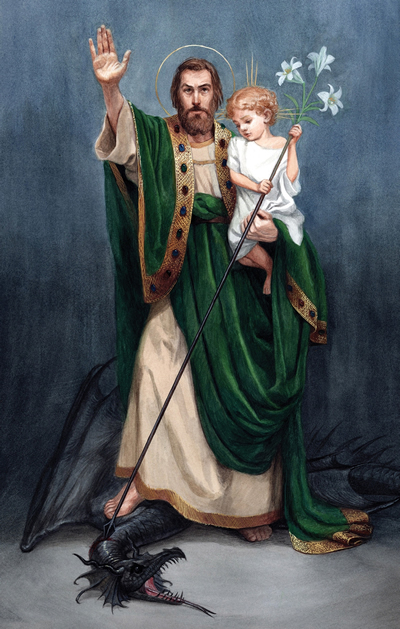
Problem #6: The Church is under coordinated attack by our culture & institutions
Solution #6: St. Joseph courageously defended the Church
This battle has been raging for a long time. When did it start? When God and prayer were removed from schools? When murdering innocent babies was legalized? It is hard to say for sure, but it only seems to have accelerated recently. Fundamental concepts God established in the natural order and once universally understood are now questioned and redefined. Our newest Supreme Court Justice could not define a woman. Public school curricula actively groom children to believe God made a mistake when He created them in their biological bodies. Make no mistake, such developments are spiritual attacks on God and His natural order.
Many Americans identify as Christians. However, many are only willing to do so when it is easy. As soon as following Jesus becomes difficult, they fall in line. I’ve seen this in personal experience. Close family members and neighbors act like cheerleaders for Jesus. But at the first sign of adversity, they become like paper in the rain.
St. Joseph modeled the courage to stand up for the Church. When he learned of Mary’s pregnancy, he could have ducked out to abdicate his responsibility. He stood by the Church. When he learned of Herod’s plan to kill young Jesus, he could have refused the danger and preserved himself. He stood by the Church. When Joseph & Mary presented Jesus at the Temple in Jerusalem:
And Simeon blessed them, and said to Mary his mother: Behold this child is set for the fall and for the resurrection of many in Israel, and for a sign which shall be contradicted; And thy own soul a sword shall pierce, that, out of many hearts, thoughts may be revealed.
Luke 2:34 – 35
Undoubtedly these words about Jesus and Mary caused Joseph much anguish. But again, he trusted God and stood by the Church. St. Joseph’s steadfast defense of the Church earned him the titles “Most Courageous”, “Terror of Demons”, and “Protector of the Holy Church”. Are we willing to be like St. Joseph and stand up for Jesus and His Church?
For our wrestling is not against flesh and blood; but against principalities and powers, against the rulers of the world of this darkness, against the spirits of wickedness in the high places. Therefore take unto you the armour of God, that you may be able to resist in the evil day, and to stand in all things perfect.”
Ephesians 6:12 – 13
Indeed, we are engaged in spiritual warfare. Every moment is a battle against the forces of evil. We must turn to God for our strength. But we can look to St. Joseph as an example.
Conclusion:
I have only scratched the surface of the wonders of St. Joseph, with a specific focus on his practical lessons that we can apply to the problems of modern manhood. I encourage you to check out Consecration to St. Joseph by Fr. Donald H. Calloway, MIC for a much deeper examination of St. Joseph. He is a wonderful role model for men today. Someone we should all imitate.

Collin is an actuary by day, a firefighter and EMT by night, and a Christian all the time. He is trying to know, love, serve, and glorify God the best he can. He can be found on gab @CollinChristovich
Note: Bible verses from Douay Rheims translation
Painting Credits (In order):
- Cover image for Consecration to St. Joseph, artist unknown
- Holy Family, by Corbert Gauthier
- Saint Joseph and Jesus with John the Baptist, by Melchior Paul von Deschwanden
- St. Joseph, Terror of Demons, by Bernadette Carstensen


